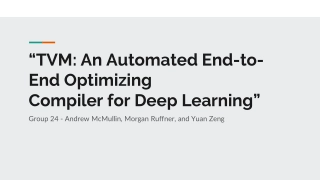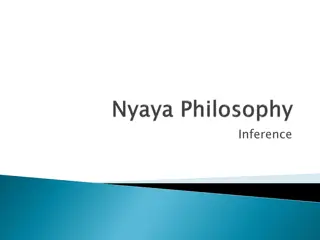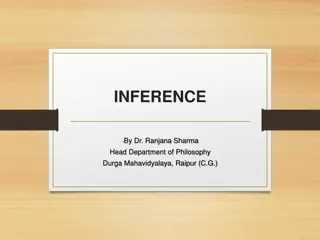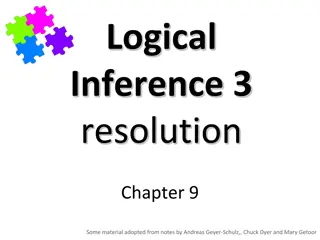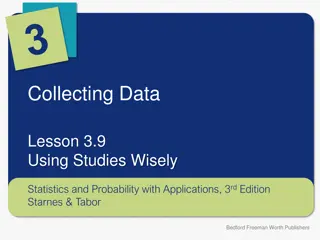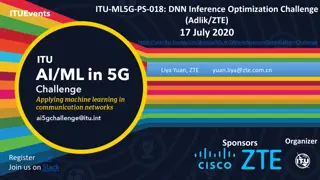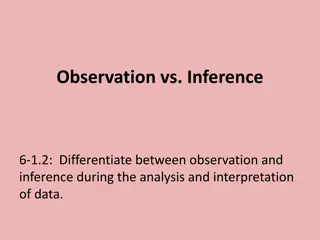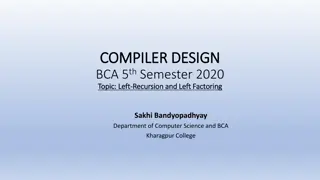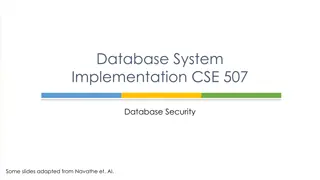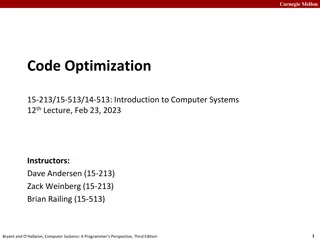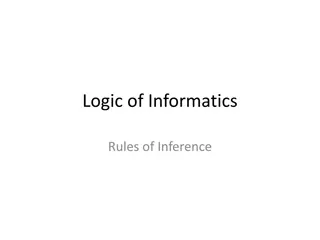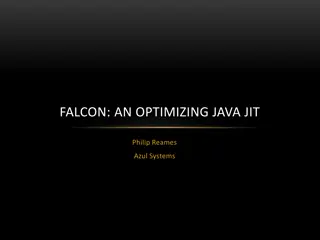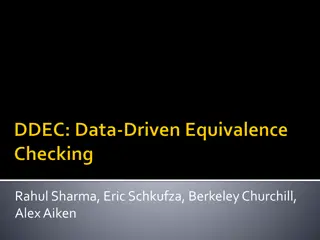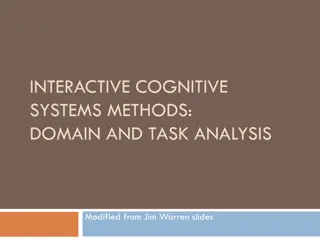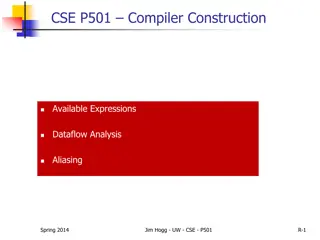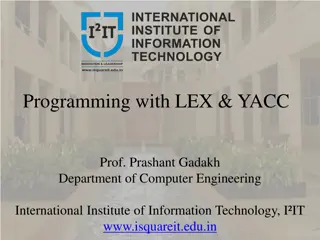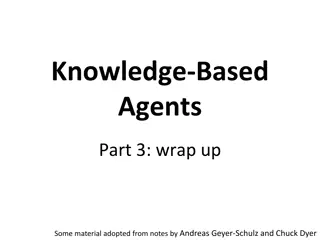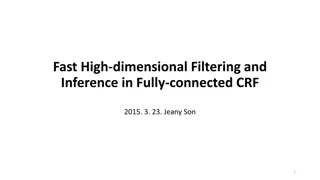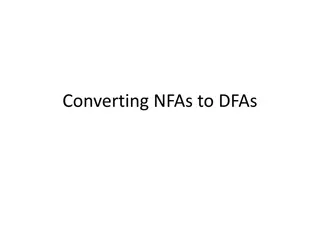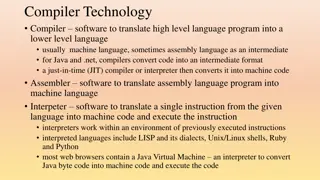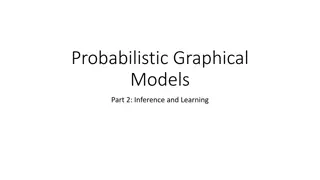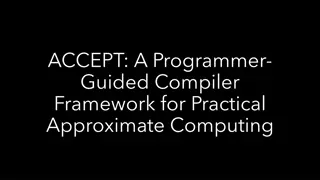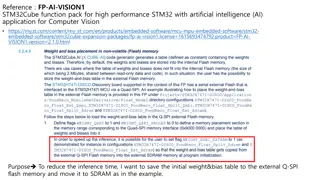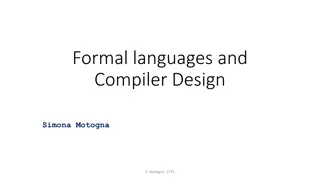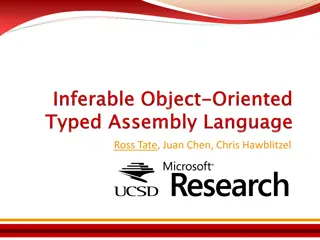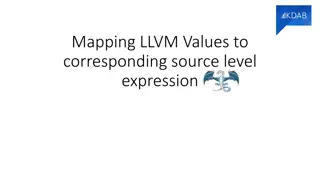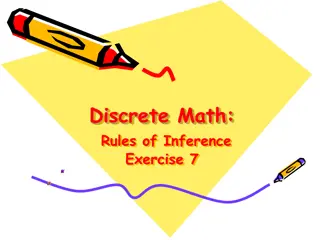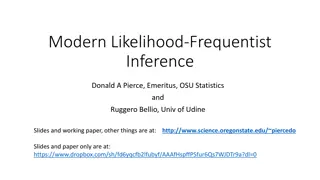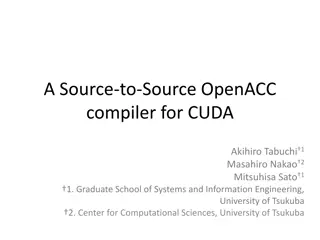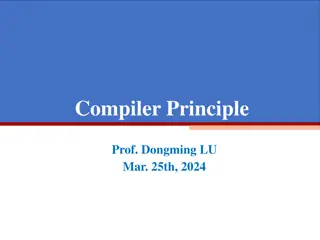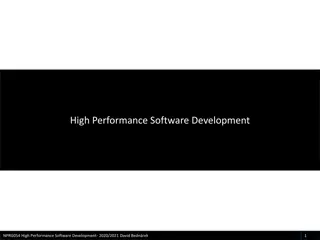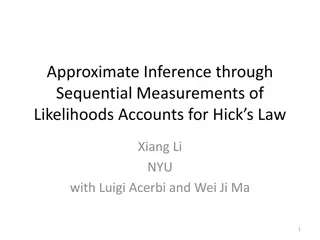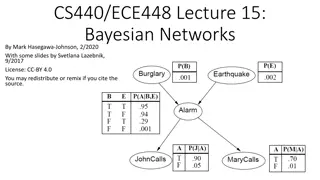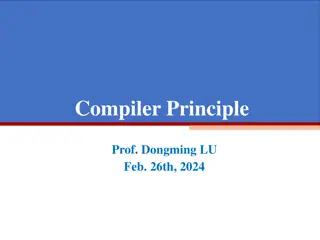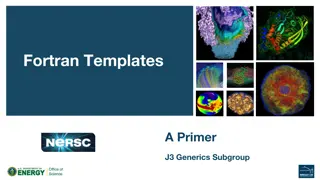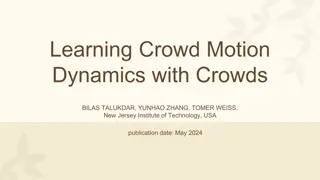TVM: An Automated End-to-End Optimizing Compiler for Deep Learning
TVM is a compiler that generates optimized code for diverse hardware back-ends from high-level specifications of deep learning programs, addressing the challenges of diverse hardware characteristics.
7 views • 16 slides
Genomic Inference of Human Population Size Changes Over Time
Explore the genomic inference of a severe human bottleneck during the Early to Middle Pleistocene transition, tracing the evolution of hominins over the last 4 million years, and studying essential events in the emergence of humans in the last one million years. Discover well-known human population
4 views • 33 slides
Inference and Vyapti in Logic
Inference, known as Anumana in Sanskrit, is the process of deriving knowledge based on existing information or observations. It can be used for personal understanding or to demonstrate truths to others. An inference may be SvArtha (for oneself) or ParArtha (for others). Vyapti, the invariable concom
1 views • 14 slides
Inference in Indian Philosophy
In Indian philosophy, inference is considered one of the six ways to attain true knowledge. It involves three constituents: Hetu (middle term), Sadhya (major term), and Paksha (minor term). The steps of inference include apprehension of the middle term, recollection of the relation between middle an
12 views • 8 slides
Resolution in Logical Inference
Resolution is a crucial inference procedure in first-order logic, allowing for sound and complete reasoning in handling propositional logic, common normal forms for knowledge bases, resolution in first-order logic, proof trees, and refutation. Key concepts include deriving resolvents, detecting cont
2 views • 12 slides
Scope of Inference in Statistical Studies
Statistical studies require careful consideration of the scope of inference to draw valid conclusions. Researchers need to determine if the study design allows generalization to the population or establishes cause and effect relationships. For example, a study on the effects of cartoons on children'
1 views • 15 slides
DNN Inference Optimization Challenge Overview
The DNN Inference Optimization Challenge, organized by Liya Yuan from ZTE, focuses on optimizing deep neural network (DNN) models for efficient inference on-device, at the edge, and in the cloud. The challenge addresses the need for high accuracy while minimizing data center consumption and inferenc
0 views • 13 slides
The Difference Between Observation and Inference
Learn to differentiate between observation (direct facts or occurrences) and inference (interpretations based on existing knowledge or experience) through examples such as the Sun producing heat and light (observation) and a dry, itchy skin leading to the inference that it is dry. The distinction be
2 views • 14 slides
Left Recursion and Left Factoring in Compiler Design
Left recursion and left factoring are key concepts in compiler design to optimize parsing. Left recursion can be problematic for top-down parsers and needs to be eliminated using specific techniques. Left factoring is a method to resolve ambiguity in grammars with common prefixes, making them suitab
0 views • 15 slides
Introduction to Database Security and Countermeasures
Database security is essential to protect data integrity, availability, and confidentiality. Countermeasures such as access control, inference control, flow control, and encryption can safeguard databases against threats. Access control restricts user access, inference control manages statistical da
2 views • 26 slides
Evolution of Compiler Optimization Techniques at Carnegie Mellon
Explore the rich history of compiler optimization techniques at Carnegie Mellon University, from the early days of machine code programming to the development of high-level languages like FORTRAN. Learn about key figures such as Grace Hopper, John Backus, and Fran Allen who revolutionized the field
0 views • 49 slides
Navigating Statistical Inference Challenges in Small Samples
In small samples, understanding the sampling distribution of estimators is crucial for valid inference, even when assumptions are violated. This involves careful consideration of normality assumptions, handling non-linear hypotheses, and computing standard errors for various statistics. As demonstra
0 views • 19 slides
Rules of Inference in Logic
Dive into the world of logic with this detailed exploration of rules of inference. Learn about different types of arguments, such as Modus Ponens and Modus Tollens, and understand how to determine the validity of an argument. Discover the purpose of rules of inference and unravel the logic behind co
0 views • 17 slides
Falcon: An Optimizing Java JIT Compiler Overview
Explore Falcon, an LLVM-based just-in-time compiler for Java bytecode developed by Azul Systems. Learn why using LLVM to build a JIT compiler is beneficial, address common objections, and dive into the technical and process lessons learned through its development timeline.
0 views • 66 slides
Enhancing Chapel Compiler with Interfaces and Semantic Changes
Explore the evolution of Chapel compiler with the integration of interfaces, semantic modifications, and improvements in error messages. Delve into the concepts of constrained generics, function call hijacking prevention, and the impact on compiler efficiency.
0 views • 30 slides
Ensuring Equivalence in Compiler Optimization Programs
Explore the challenges of proving equivalence in compiler optimization programs, validate refactorings, and analyze the trustworthiness of compilers through binary equivalence testing. Learn about handling loops, utilizing decision procedures, and running tests to confirm program behavior.
0 views • 24 slides
Expert Systems and Knowledge Inference
Expert Systems (ES) act as synthetic experts in specialized domains, emulating human expertise for decision-making. They can aid users in safety, training, or decision support roles. Inference rules and knowledge rules play key roles in ES, helping in problem-solving by storing facts and guiding act
0 views • 63 slides
Dataflow Analysis for Available Expressions in Compiler Construction
Utilizing dataflow analysis techniques, the concept of available expressions is discussed in the context of compiler construction. The goal is to identify common subexpressions that span basic blocks by calculating their availability at the beginning of each block. The process involves determining w
0 views • 59 slides
Introduction to Lex and Yacc: Compiler Design Essentials
Lex and Yacc are essential tools in compiler design. Lex serves as a lexical analyzer, converting source code to tokens, while Yacc is a parser generator that implements parsing based on BNF grammars. Through these tools, strings are processed, and code is generated for efficient compilation. This i
0 views • 10 slides
Knowledge-Based Agents: Inference, Soundness, and Completeness
Inference, soundness, and completeness are crucial concepts in knowledge-based agents. First-order logic allows for expressive statements and has sound and complete inference procedures. Soundness ensures derived sentences are true, while completeness guarantees all entailed sentences are derived. A
0 views • 6 slides
Fast High-Dimensional Filtering and Inference in Fully-Connected CRF
This work discusses fast high-dimensional filtering techniques in Fully-Connected Conditional Random Fields (CRF) through methods like Gaussian filtering, bilateral filtering, and the use of permutohedral lattice. It explores efficient inference in CRFs with Gaussian edge potentials and accelerated
0 views • 25 slides
Compiler Data Structures and NFA to DFA Conversion
Compiler data structures play a crucial role in the compilation process, handling lexical analysis to code generation. Understanding the conversion from non-deterministic finite automata (NFA) to deterministic finite automata (DFA) is essential for efficient language processing and optimization.
0 views • 10 slides
Façade Design Pattern in Structural Design Patterns
Façade design pattern simplifies the interface of a complex system by providing a unified and straightforward interface for clients to access the system's functionalities. It helps in isolating the clients from the complexities of underlying components, offering a more user-friendly experience. The
0 views • 48 slides
Overview of Compiler Technology and Related Terminology
Compiler technology involves software that translates high-level language programs into lower-level languages, such as machine or assembly language. It also covers decompilers, assemblers, interpreters, linkers, loaders, language rewriters, and preprocessing steps used in compilation. Understanding
0 views • 29 slides
Probabilistic Graphical Models Part 2: Inference and Learning
This segment delves into various types of inferences in probabilistic graphical models, including marginal inference, posterior inference, and maximum a posteriori inference. It also covers methods like variable elimination, belief propagation, and junction tree for exact inference, along with appro
0 views • 33 slides
ACCEPT: A Programmer-Guided Compiler Framework for Practical Approximate Computing
ACCEPT is an Approximate C Compiler framework that allows programmers to designate which parts of the code can be approximated for energy and performance trade-offs. It automatically determines the best approximation parameters, identifies safe approximation areas, and can utilize FPGA for hardware
0 views • 15 slides
Optimizing Inference Time by Utilizing External Memory on STM32Cube for AI Applications
The user is exploring ways to reduce inference time by storing initial weight and bias tables in external Q-SPI flash memory and transferring them to SDRAM for AI applications on STM32Cube. They have questions regarding the performance differences between internal flash memory and external memory, r
0 views • 4 slides
Formal Languages and Compiler Design by Simona Motogna - Overview
This content provides an in-depth look into the course "Formal Languages and Compiler Design" by Simona Motogna. Covering topics such as compiler design, organization issues, history of programming languages, structure of a compiler, scanning techniques, and more. It also delves into the components
0 views • 18 slides
Typed Assembly Language and Type Inference in Program Compilation
The provided content discusses the significance of typed assembly languages, certifying compilers, and the role of type inference in program compilation. It emphasizes the importance of preserving type information for memory safety and vulnerability prevention. The effectiveness of type inference me
0 views • 17 slides
Compiler Optimizations in LLVM: Challenges and Solutions
Compiler optimizations in LLVM, such as loop vectorization, are crucial for enhancing program performance. However, understanding and addressing optimization challenges, like backward dependencies, can be complex. This article explores how LLVM values map to corresponding source-level expressions an
0 views • 41 slides
Rules of Inference Exercise Solutions in Discrete Math
This content provides solutions to exercises involving rules of inference in discrete mathematics. The solutions explain how conclusions are drawn from given premises using specific inference rules. Examples include identifying whether someone is clever or lucky based on given statements and determi
0 views • 4 slides
Modern Likelihood-Frequentist Inference: A Brief Overview
The presentation by Donald A. Pierce and Ruggero Bellio delves into Modern Likelihood-Frequentist Inference, discussing its significance as an advancement in statistical theory and methods. They highlight the shift towards likelihood and sufficiency, complementing Neyman-Pearson theory. The talk cov
0 views • 22 slides
OpenACC Compiler for CUDA: A Source-to-Source Implementation
An open-source OpenACC compiler designed for NVIDIA GPUs using a source-to-source approach allows for detailed machine-specific optimizations through the mature CUDA compiler. The compiler targets C as the language and leverages the CUDA API, facilitating the generation of executable files.
0 views • 28 slides
Overview of Compiler Principle - Prof. Dongming LU
Introduction to compiler principles with a focus on lexical analysis, parsing, abstract syntax, semantic analysis, activation records, translating into intermediate code, and other key aspects related to bindings in the Tiger compiler. The content covers topics like semantic analysis, name spaces, t
0 views • 21 slides
High Performance Software Development - Topics and Related Lectures
This course on High Performance Software Development covers various topics such as modern programming styles, CPU properties, performance tuning, compiler optimization, memory hierarchy, and more. It also emphasizes the importance of using vector instructions within C/C++ for parallel programming. T
0 views • 10 slides
Sequential Approximate Inference with Limited Resolution Measurements
Delve into the world of sequential approximate inference through sequential measurements of likelihoods, accounting for Hick's Law. Explore optimal inference strategies implemented by Bayes rule and tackle the challenges of limited resolution measurements. Discover the central question of refining a
0 views • 29 slides
Bayesian Networks for Efficient Probabilistic Inference
Bayesian networks, also known as graphical models, provide a compact and efficient way to represent complex joint probability distributions involving hidden variables. By depicting conditional independence relationships between random variables in a graph, Bayesian networks facilitate Bayesian infer
0 views • 33 slides
Compiler Principle by Prof. Dongming LU: Overview and Phases
Compiler Principle course explores the translation of programming languages into executable code using techniques, data structures, and algorithms. The course covers modules, interfaces, and phases of a typical compiler, emphasizing the importance of abstract syntax and intermediate code. Key concep
0 views • 37 slides
Fortran Templates and Compiler-Driven Design Goals
Delve into the world of Fortran templates through a primer on generics, showcasing design goals set by the compiler. Explore syntax examples and motivating examples such as the AXPY subroutine, offering insight into the self-consistent nature of templates and their flexibility in parameter combinati
0 views • 9 slides
Dynamic Crowd Simulation Using Deep Reinforcement Learning and Bayesian Inference
This paper introduces a novel method for simulating crowd movements by combining deep reinforcement learning (DRL) with Bayesian inference. By leveraging neural networks to capture complex crowd behaviors, the proposed approach incorporates rewards for natural movements and a position-based dynamics
0 views • 15 slides
